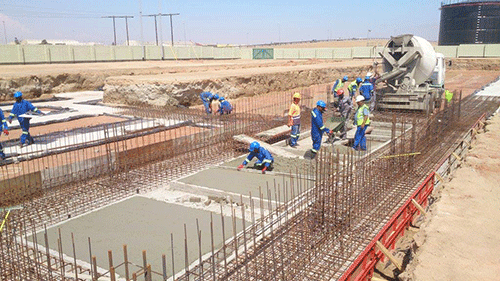The second year of the collective agreement negotiated between the Construction Industries Federation of Namibia (CIF), Metal, and Allied Workers Union (MANWU), in May 2021 and then published on 2 November 2021 in Government Gazette No. 7675, will commence on 2 November 2022. This means that the minimum wage payable will increase by 2.6%.
However, the CIF yesterday clarified this increase is not a general increase of 2.6% across the entire industry. This is because it is only relevant to the categories as listed in the collective agreement.
“Also, it is not a general increase of 2.6% for the respective employees in those positions. In fact, some employers are already paying more than the stipulated minimum wage for respective categories in the collective agreement. The 2.6% increase means that the minimum wage payable has only increased for the respective categories,” read a CIF statement.
The current minimum wage payable in the construction sector is still N$17.38 per hour, as per Government Gazette, No. 7675. This will increase to N$17.84 per hour when wages are due to be paid at the end of November 2022. Although the CIF is one of the negotiating parties, conditions as stipulated in the collective agreement are applicable and mandatory for everyone operating in the sector, irrespective of whether they are a member of the CIF or not. “This will ensure that minimum wages payable as per employment categories will be the same across the entire construction sector. Although employers can pay more than the minimum payable wage, if desired. This will ensure a level playing field in the industry and that wages do not become a differentiating factor for when building and construction companies are bidding for tenders or work,” the CIF added.
Meanwhile, other benefits for employees in the sector remain the same until a next collective agreement is negotiated. These proposed benefits include a service allowance equal to 150 hours of an employee’s wage, which is to be paid as part of the December remuneration before the commencement of annual leave during December. It is also mandatory that all employees, for whom minimum wages are payable are prescribed as per the agreement, are registered by the employer with the Namibian Building Workers Pension Fund (NBWPF). Alternatively, employers can offer pension and retirement benefits that provide for the same as the NBWPF, or indeed better benefits.
“We encourage all employers in our sector to adhere to the requirements as stipulated in the collective agreement, published in Government Gazette No 7675. Of course, the CIF understands that our industry is really struggling – we see less private and public investment, global supply chain problems, fluctuating fuel prices, ongoing unjustifiable competition with foreign contractors, and not the least, there are also issues about late payment. But we have to honour our commitment as per the agreement,” said chief executive officer of the CIF, Bärbel Kirchner.
She added that industry employees are equally affected by high inflationary pressures and rely on the federation’s support.“Employers and employees really need to pull together, where our contractors will commit themselves to paying the 2.6% increase of minimum wage payable and where construction workers equally commit themselves to high productivity levels. At the same time, we need to see that our government also focuses on a better and more conducive environment for our industry. Overall, investment friendly policies remain a top requirement, and then, specifically for the construction sector, it is critical that the industry will be regulated by a construction council in the interest of greater Namibianisation, local capacitation and regulation of our sector,” Kirchner emphasised.


